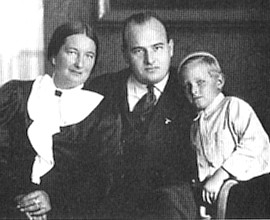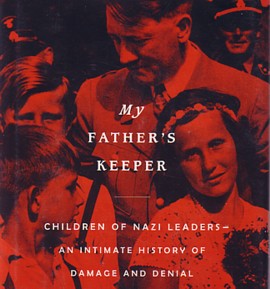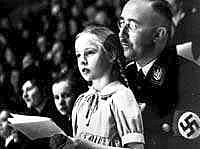Hans Frank & his sons
Niklas and Norman
(back to top)
 Brigitte,
Hans and Niklas Frank Brigitte,
Hans and Niklas Frank |
As the party jurist and head of Poland, Hans Frank assisted in two major
aspects of the Nazi party. Under his rule and assistance, the innocent
lives of millions of people were taken. Even though he was not one of
the most "powerful of men in the hierarchy of the Third Reich . .
. he was one of those chiefly responsible for the bloody German reign
of terror in Poland" (Klessmann, 39). It was said that "Frank
attempted to model himself into a replica of the Führer he idolized,
[Hitler]" (Klessmann, 43). Much of the information that is known
about Franks crimes comes from the very detailed and up to date diaries
he kept. On June 2, 1943, he wrote, "We began here with three and
a half million Jews; of those we have only a few labor companies left,
all the rest have let us say -emigrated" (Lebert, 129). Ironically,
on May 1, 1945, just hours before his arrest he told his son that"
[he] must be the only minister who is looking forward to his own arrest"
because when it happens "[he] shall hand over his diaries. Every
day is accounted for . . . [he] has nothing to fear" (Lebert, 127).
He did turn over that diary, and it was one of the main pieces of evidence
used in sentencing him to "death by hanging" at the Nuremberg
trials.
When Hans Frank was hanged on October 16, 1946, he left a wife and five
children. The Frank family was accustomed to living the lavish lifestyle
of good food, large homes, and a lot of money. Hans Frank was the
head of Poland after all. These luxuries became mere memories the day
the heavily armed Poles came in and ordered Brigitte Frank and her five
children to get "against the wall" (Lebert, 130), and interrogated
them about where Frank was hiding. As the "Poles" were tearing
the house apart looking for any sign of their corrupt head of state, the
Frank family was able to make their getaway. They were forced to move
to the next village and live on 300 Deutschmark a month. The traumatic
interrogations, the major changes of life style, and the realization that
their father aided in millions of deaths are all factors that cause the
Frank brothers to despise their father. After their father was captured,
the Franks had a hard time enrolling in schools, were discriminated against
by their teachers and peers, and were constantly accused of being Nazis.
"One day in February 1946, Niklas failed to come home from school
at the usual time," his mother finally found him at the school detention.
He was accused of drawing a swastika on the board because he "was
the kind of boy who'd draw [one]" (Lebert, 135). This is precisely
the type of event that compelled Niklas to devote a great portion of his
life to writing books and articles about the "filth" (Lebert,
147) of his father's life. In the final sentences of his book, Niklas
imagines how he opens his mouth and "bites into [his father's] heart,
and feels him screaming and screaming . . . until it stops pumping and
goes limp" (Lebert, 153). Niklas' book and articles were not received
well by the general population, but that did not stop him. In the 1959
interview Norman says that "[he] holds [his] father guilty.
He committed dreadful crimes and paid for them with his death" (Lebert,
122). Then again at the end of the 1980s Norman states that he does not
want to have kids because "the name of Frank should bid this world
farewell" (Lebert, 150). His strong hatred for his father stayed
with him throughout his life. For him to not want to start a family of
his own because of the crimes his father committed, shows a true sign
of resentment. On behalf of the Frank children, Norman told Lebert that
they are not going to try and recover any of Hans Frank's assets, because
"they are loaded with guilt" (Lebert, 139). The Frank children
want to rid themselves of the name, life, and memory left of their infamous
father. |

 Brigitte,
Hans and Niklas Frank
Brigitte,
Hans and Niklas Frank  Himmler had a very powerful and central role in the Holocaust. In his
sixteen-year term he succeeded in recruiting more than 50,000 soldiers.
With his well-built army and strong leadership, he was able to supply
enough man power to help capture and murder nine million people. Through
the help of the S.S., the Nazis were able to maintain control of the many
different camps around Europe. Himmler' s pride for his S.S. and devotion
to exterminate the "non-Aryan race," is evident from his speech
in October of 1943. He defines the "S.S. as a National Socialist
Order of men selected for their Nordic characteristics and a sworn blood
brotherhood," and states that the S.S. are "brave enough to
be unpopular . . . brave enough to be hardhearted and unfeeling!"
(Ackermann, 105). In this same speech he explains to his S.S. general
that "the Jewish people are being exterminated . . . and most of
you will know what it is like to see a hundred corpses lying together,
or 500 or 1000 . . . This is a glorious page of our history" (Ackermann,
105). Himmler, like Hitler, felt that even though Jews are "identically
biological . . . with human looking features, they are mentally and spiritually
lower than any animal; sub-human" (Ackermann, 109). Himmler was captured
and put in a British prison for his heinous actions, but like Hitler,
his most ardent follower was able to escape prosecution by committing
suicide.
Himmler had a very powerful and central role in the Holocaust. In his
sixteen-year term he succeeded in recruiting more than 50,000 soldiers.
With his well-built army and strong leadership, he was able to supply
enough man power to help capture and murder nine million people. Through
the help of the S.S., the Nazis were able to maintain control of the many
different camps around Europe. Himmler' s pride for his S.S. and devotion
to exterminate the "non-Aryan race," is evident from his speech
in October of 1943. He defines the "S.S. as a National Socialist
Order of men selected for their Nordic characteristics and a sworn blood
brotherhood," and states that the S.S. are "brave enough to
be unpopular . . . brave enough to be hardhearted and unfeeling!"
(Ackermann, 105). In this same speech he explains to his S.S. general
that "the Jewish people are being exterminated . . . and most of
you will know what it is like to see a hundred corpses lying together,
or 500 or 1000 . . . This is a glorious page of our history" (Ackermann,
105). Himmler, like Hitler, felt that even though Jews are "identically
biological . . . with human looking features, they are mentally and spiritually
lower than any animal; sub-human" (Ackermann, 109). Himmler was captured
and put in a British prison for his heinous actions, but like Hitler,
his most ardent follower was able to escape prosecution by committing
suicide.